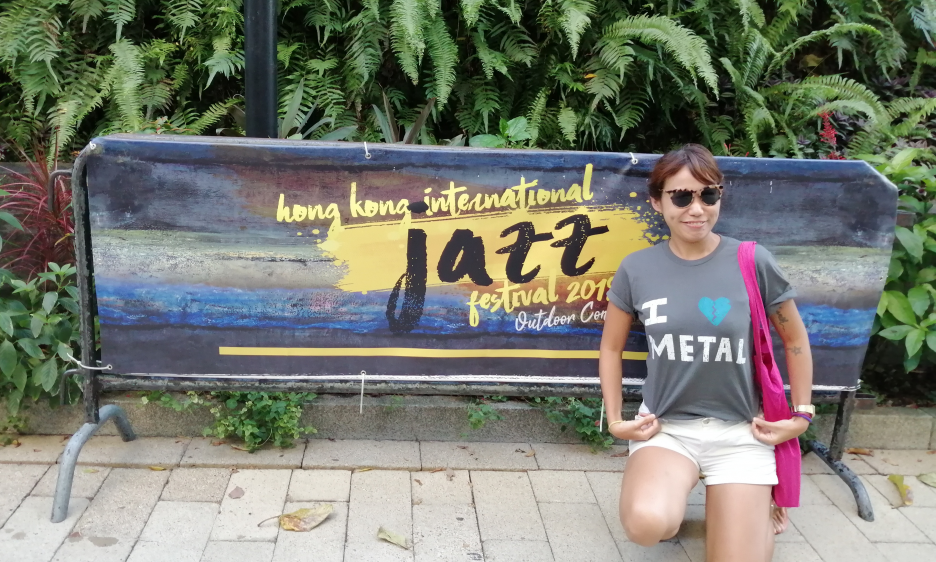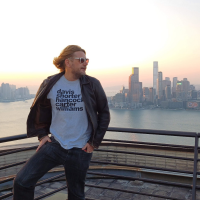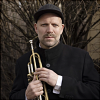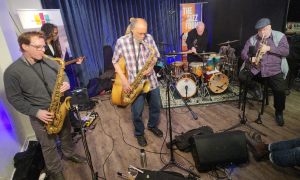Home » Jazz Articles » Live Review » Hong Kong International Jazz Festival 2019
Hong Kong International Jazz Festival 2019

Hong Kong City Hall; Hong Kong Park
Hong Kong
September 22, 25-27
We've long been told that jazz is a world language, but regional dialects are becoming an increasingly louder part of the conversation. Sitting conceptually, if not geographically, on the nexus of east and west, the Hong Kong International Jazz Festival (HKIJF) might be ideally placed to explore divergent streams of contemporary jazz—and indeed the programming of the 2019 edition appears conceived to tick off as many nations as it does sub genres. What then can we take away from the 12th edition of this four-day festival in 2019?
On the basis of these 12 acts alone, we might surmise that the most interesting music is (still?) being made in Europe—and especially, sun-starved Scandinavia—while America remains stuck in the past, too awed by the impenetrable shadow of its own creation. But a fresh generation of players in Asia continue to hunt for, and fleetingly find, their own voice in the music's storied scroll.
The festival's nominal headliner might have been the Mathias Eick Quintet, which closed the final night at Hong City Hall on September 27—and whose leader described his music pretty accurately from the stage as "beautiful, melodic, Nordic jazz" with the lack of hubris only a financially secure Norwegian can muster. Eick's deceptively simple, unashamedly sentimental compositions are built around slow, rolling, chords and lyrical, folkish melodies; evaporating from his breathy horn like melting icicles, often floating in unison or harmony with violinist Håkon Aase, both of whom subtly pepper their tones with electronic effects. Deeply vibed and icily constructed, any improvisations are unshowy affairs, skirting through the soundscape, not over it—only drummer Torstein Lofthus' restrained solo gets a clap.
Quintessential ECM, then— and this material from latest release Ravensburg (ECM Records, 2018) finds Eick in an especially sentimental mode. In Hong Kong, "Family" was followed by "Children" and "Friends"—titles which reveal a man looking backwards and inwards—performed in the same over-rehearsed arc of the album. A former member of commanding experimental collective Jaga Jazzist, Eick's playing here is instead sometimes so subdued he appears to be barely breathing, or talking, into his trumpet. When this fails he drops it all together and sings in a delicate but imperfect rasp—especially naked on the intimate, fleeting encore, "For My Grandmothers," Eick's voice backed by just piano and violin.
Dressed in the same casual-Scandic uniform of baggy tees and baseball caps was the thrilling multi-instrumental group lead by Morten Schantz, a Danish pianist best known for his work in fusion-flavored JazzKamikaze alongside sax firebrand Marius Neset—a notably loud voice on Schantz's searing second solo release Godspeed, whose parts are instead picked up by British upcomer Josh Arcoleo in Hong Kong. The thrilling trio is completed here as in on record, with Swedish drummer Anton Eger of Phronesis fame—but no one plays the same instrument for very long.
Flirting with the experimentation of classic fusion and the interplay of post-Esbjorn Svensson trio recordings, astride post-rock aesthetic and the euphoria, and electrics, of the dancefloor, Shantz's vision is a manifesto for the next generation of instrumental music—and mounts a mighty compelling argument. With suite-like pacing, Shantz's episodic originals are presented in a rollercoaster arc, ebbing from moody dirges to frenetic, frenzied riffing and blissed-out climaxes which hint at EDM ecstasies, but never lose sight of the garden.
It all rests on a studied control, a defined trajectory colliding with the impulse of the moment; Shantz fiddles with loops and samples at his side, while fingering two small synths sitting atop his grand piano, while Arcoleo proves himself more useful than Neset—and no less engaging an improvisor on sax—by switching to electric bass during the music's denser rhythmic wig-outs. These belong to the ever-excellent Eger, who by contrast stands to dabble in synth lines when the storms he creates calm.
This is not dumbed-down music—there's a clear touch of Joe Zawinul to the way Shantz's mathematical melodies unfold (especially on title track "Godspeed"). But with a clear ear for the big beats and hummable hooks that work in clubs, and appearing in person more like energetically healthy EDM stars than starving practice-scarred jazz musicians—Shantz himself turned out in a particularly garish camouflage blazer— one can see this group's live dynamism continuing the work begun by acts like The Comet Is Coming to propel improvised music onto mainstream festival stages.
The baggage of fusion pioneers Weather Report and Return to Forever is hung with equal force around the neck of neighbors Elephant9, who were doomed to follow Shantz onto the stage. But where the 30-something Dane's music smashed the shackles of decades past, the older Norwegian group proved utterly bogged down in a tired aesthetic and archaic indulgence.
A rock-ish electric trio, Elephant 9 is a vehicle for the water-treading outpourings of veteran leader Ståle Storløkken, whose screeching organ exhortations rest on the deadening thumb of drummer Torstein Lofthus's bricklayer's thwomp and the bassist Nikolai Haengle's one-chord thrashing. The overall effect is of a competent psych-rock rhythm section lacking a transcendent singer and/or guitarist to save them from their middling meanders—without which they may as well be three old hippies jamming in the garage, beneath a tattered poster of Jimi Hendrix tacked to the wall.
A straitjacketed reverence for the past held the same sway over the festival's big American headliner Greg Osby, a saxophonist whose career, it must be said, has seen better days. Disgraced by sexual misconduct claims and reportedly dismissed from his position at Berklee College of Music, the former Blue Note Records poster-boy has been reduced to plodding through standards with what I can only presume was a pickup band—not least because Hong Kong's very own Nate Wong was behind the kit. And Osby hasn't been to the city for 30 years.
Osby promised us "a journey" through the great American songbook, but in the end we didn't travel all that far: after two engaginly moody modal vamps in the Tranian channel we got a couple of ballads and a pair blues progressions,, before a lazy semi-encore of Lou Donaldson's "Alligator Boogaloo." But even excused as a glorified club set, nothing quite cooked: Canadian electric bassist Sylvain Gagnon locked a lazy groove and soloed with a guitarist's overbaked flash, Korean pianist Jangeun "JB" Bae played with a pernickety precision and an overexcited Wong perhaps drove just a little too hard.
Nearly every number began with an a capella sax workout, token pyrotechnics which sated musos gagging for some trademark flourish, but there was none of the harmonic invention or brash daring of his vintage recordings like Banned in New York (Blue Note, 1998) and The Invisible Hand (Blue Note, 2000), no flicker of why Osby was once called one of his generation's "most provocative musical thinkers" by The New York Times. The whole thing felt sadly phoned in.
It would be easy to blame the material—and the indolent attitudes a standards songbook affords big name soloists on tour—but Osby's antithesis would be found in the compatriot SJZ Collective, an equally reverential but phenomenally more inventive quintet of virtuosos, which approaches vintage material as the jumping off point for electrifying arrangements that feel both fresh and familiar.
Building on the repertoire developed for last year's powerhouse debut SJZ Collective Reimagines Monk (Retlaw Records, 2018) the San Jose quintet have expanded their purview to pay tribute to jazz's other great iconoclast composer: Charles Mingus whose "Boogie Stop Shuffle" was the fuel for a furious fusion bop lasting a riveting quarter of an hour, saxophonist Oscar Pangilinan and trumpet player John L Worley Jr. stretching out regally.
Next, the album's centerpiece, Thelonious Monk's "'Round Midnight" was recast as a goosebump dream-rock mood-scape, propelled by endlessly inventive guitarist Hristo Vitchev's winding arpeggios, before Mingus classic "Fables of Faubus"— driven by the dancing bass of bassist Saul Sierra asymmetrical chum. When things close with Monk's "Theo," we've heard just four songs stretched to an hour, bumped up by a cheeky, fleeting encore of Mingus' "Slippers." Led by drummer Wally Schnalle but conceived as an open-door collective (the album's organist Brian Ho was conspicuously absent), this is new-old jazz of the highest caliber, and one prays more gold is bottled soon (perhaps a Mingus album is next?).
Crisscrossing the Atlantic again—away from the loud/quiet extremes of Nordic jazz, HKIJF's Central European offerings appeared stereotypically attached to the concert hall traditions of centuries past. Duo Paier Valcic—an, er, duo of Croatian celloist Asja Valcic and Austrian accordionist Klaus Paier—served up a riveting, breakneck set of chamber-jazz drawing liberally from tango, classical folk and Gypsy traditions. Celebrating their tenth year as a duo with the brand new Vision for Two—10 Years (Act Music, 2019)—and wrapping a ten-date China tour in Hong Kong—there was an easy chemistry as the pair whizzed through the pair's deceptively knotty charts, such as Valcic's "Straight 13," in 13/8 time, delivered with breezy aplomb.
Especially jaw-dropping is Valcic, who plays cello with the penetrating concentration of a chamber recital, and the irreverent fire of a punk-rock show— thrumming, plucking, bowing and whacking her instrument with an unhinged recklessness, eyes closed, hair billowing. But stoic, sweaty Paier is not outdone, especially when he switches to bandoneon (an instrument, Valcic notes, Europe "forgot" before Astor Piazzolla came out to play) for two self-penned closing tangos, "Silk Road" and "Ayer." Too good, too short, too much.
The other Central European, male-female duo on offer—Maria Baptist and Jan von Klewitz— offered less fire but plenty of ice. He, a saxophonist and member of her big band, is clearly a junior partner in this pair-down setting. The whole set is devoted to Baptist's stately originals; earnest, yearning, classical-ish affairs which fold organically into one another, but perhaps veer too often towards cliché. "Poems Without Words" is how she described her works on a 2017 release of the same name, but more conversation would be nice—while von Klewitz gets bars to blow in, again it's notable not a single solo stood out enough for any applause. Baptist's respect for form, structure and rhythm may be better suited to the larger ensembles she more regularly writes for.
A similar whiff of formalism infected the approach of Az Samad, a talented Malaysian acoustic guitarist who opened the festival's free outdoor gig, in the central Hong Kong Park on September 22. Performing on a steel-string astride, with a chilled combo of sax and bass, Samad flew the flag for the overlooked Southeast Asia jazz scene with a pleasant set mixing robust originals with regional regulars, such as closer "Getaran Jiwa," described as the "quintessential Malaysian jazz standard."
Less diverting was Indian-born, Japanese-based singer Tea who—despite a strong voice built for soul and a patience-testing stage shtick— clogged up the ticketed bill with a handful of generic pop originals and a catalog of unconvincing covers (Stevie Wonder's "Higher Ground," Alanis Morissette "You Learn" and, worst of all, Amy Winehouse's "Valerie") more befitting a cruise ship that this theater environment.
Hong Kong itself was well represented by two noteworthy talents, facing in completely different directions. A long-term labor of love for the Hong Kong Philharmonic's double bassist Sam Ferrer, Shaolin Fez is a pleasantly confused mid-band outfit, mixing pop-funk songwriting with the studious horn arrangements of a US conservatoire-trained brain with something to prove. Engaging selections from this year's new EP This is Now Our Home— especially the half-spoken vamp of "Rock, Moon, Rain, Sea"—stood up next to smart arrangements of Pat Metheny's "5 5 7" and Robert Glasper's "Gonna Be Alright (F.T.B.)," with guest vocalist Gretchell Yameza soaring especially in the latter.
Of a purer lineage was Hong Kong-born Ron Ng, a thoughtful guitarist who performed a reverentially purist's set of largely jazz manouche flavor. With not a semi-quaver out of place, Ng lead an impeccably rehearsed, drummer-less quartet through evergreen standards "Honeysuckle Rose" and "Minor Swing," a studious concentration etched onto his face. Making everything look easy at his side was frequent collaborator Sharon Lui, a free-flowing violin virtuoso who counted out most of the tunes and probably deserved at least co-headline status. Maybe next year.
Tags
Live Reviews
Mathias Eick
Rob Garratt
Hong Kong
Torestein Lofthus
Jaga Jazzist
Morten Schantz
JazzKamikaze
marius neset
Josh Arcoleo
Anton Eger
Phronesis
Esbjorn Svensson
Joe Zawinul
The Comet Is Coming
Weather Report
Return To Forever
Elephant9
Ståle Storløkken
Torstein Lofthus
Nikolai Haengle
Jimi Hendrix
Greg Osby
Blue Note Records
Nate Wong
Lou Donaldson
Sylvain Gagnon
SJZ Collective
Charles Mingus
Oscar Pangilinan
Thelonious Monk
Hristo Vitchev
Saul Sierra
Wally Schnalle
Brian Ho
Asja Valcic
Klaus Paier
Astor Piazzolla
Maria Baptist
Jan von Klewitz
Az Samad
Tea
Shaolin Fez
Robert Glasper
Sharon Lui
pat metheny
PREVIOUS / NEXT
Support All About Jazz
 All About Jazz has been a pillar of jazz since 1995, championing it as an art form and, more importantly, supporting the musicians who make it. Our enduring commitment has made "AAJ" one of the most culturally important websites of its kind, read by hundreds of thousands of fans, musicians and industry figures every month.
All About Jazz has been a pillar of jazz since 1995, championing it as an art form and, more importantly, supporting the musicians who make it. Our enduring commitment has made "AAJ" one of the most culturally important websites of its kind, read by hundreds of thousands of fans, musicians and industry figures every month.

























